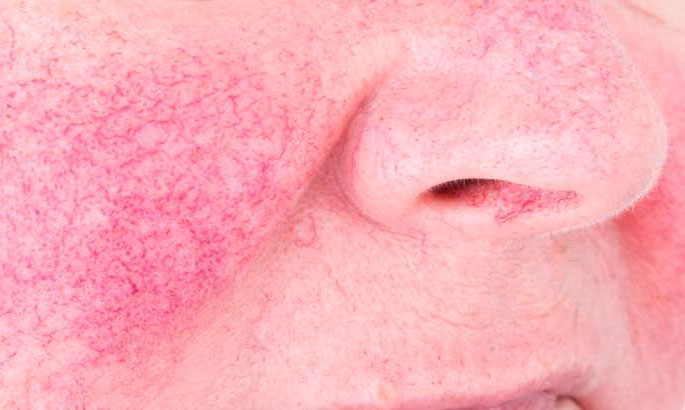Navigating Rosacea: A Cosmetologist’s Guide to Understanding and Managing This Chronic Skin Condition
Rosacea is a common but often misunderstood skin condition that presents unique challenges in the field of cosmetology. Characterized by persistent redness, visible blood vessels, and pustular breakouts, rosacea can have a significant impact on a person’s appearance and self-esteem. This article aims to provide cosmetologists with a comprehensive understanding of rosacea and strategies to support clients managing this condition.

Rosacea
Understanding Rosacea
Rosacea is a chronic inflammatory skin condition that primarily affects the face, particularly the cheeks and nose. It commonly begins with a tendency to blush or flush more easily than others. Over time, these flushing episodes can lead to persistent redness, broken blood vessels, and in more severe cases, acne-like breakouts.
While the exact cause of rosacea remains unknown, several theories exist. Genetic predisposition is one such theory, suggesting that those with a family history of rosacea may be more susceptible. Another theory points to the role of microscopic mites, named Demodex folliculorum, which are usually harmless but can cause inflammation in people with rosacea.
Various triggers can exacerbate rosacea symptoms, including heat and sun exposure, extreme cold, stress, spicy foods, caffeine, and alcohol. However, triggers can be highly individual and vary from person to person.

The Role of the Cosmetologist in Managing Rosacea
Cosmetologists, with their close relationship to their clients, play a pivotal role in the management of rosacea.
- Recognizing Symptoms: Cosmetologists are often the first to notice the signs of rosacea, such as flushing, visible blood vessels, and pustular breakouts. It is essential to identify these symptoms early, as timely intervention can slow the progression of the disease.
- Education and Guidance: Providing clients with information about rosacea, its triggers, and how to manage it is a critical aspect of a cosmetologist’s role. This includes advice about avoiding known triggers, using gentle skincare products, and the importance of sun protection.
- Skincare Recommendations: Those with rosacea have sensitive skin, so it is essential to recommend skincare products that are gentle, hypoallergenic, and noncomedogenic. Clients should be encouraged to test new products on a small area of skin to ensure they don’t exacerbate rosacea symptoms.
- Referring to Dermatologists: Cosmetologists can play a crucial role in initiating a dermatologist referral for a definitive diagnosis and treatment plan. While cosmetologists can provide valuable advice and support, it is important to remember that the diagnosis and treatment of rosacea should be under the guidance of a medical professional.
As skincare experts, cosmetologists can significantly impact the lives of clients with rosacea. By understanding the disease, recognizing its symptoms, providing appropriate skincare recommendations, and knowing when to refer to a dermatologist, cosmetologists can help clients manage this chronic condition, contributing to their overall wellbeing and self-esteem.






